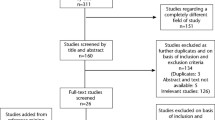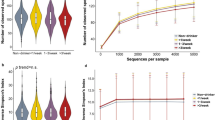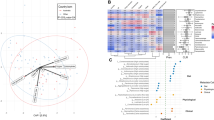Abstract
Introduction
Sugar Sweetened Beverages (SSB) can significantly influence saliva leading to a more acidic environment which makes our oral cavity prone to various oral diseases. This study investigates the influence of SSBs on salivary parameters by analyzing the existing plethora of research.
Objective
To systematically review and analyze the impact of SSBs on changes in salivary pH, flow rate and bacterial proliferation.
Methodology
Pubmed, Embase, EBSCO, Web of Science, and Cochrane databases were searched using the PECO strategy. Risk of Bias was assessed using Newcastle Ottawa Scale and Cochrane Risk of Bias assessment tools. Meta-analysis was conducted among the eligible studies using a random effects model.
Results
A total of twenty eight studies were found eligible after a thorough PRISMA search in the databases. Many studies consistently demonstrated a rapid decline in salivary pH post-SSB consumption, creating an acidic environment conducive to enamel demineralization. Few studies also reported reduced salivary flow rate and prolonged oral clearance times. Increased proliferation of acidogenic bacteria and fungi was noted. Risk of bias was low overall, but a few studies reported limitations such as randomization bias and missing data.
Conclusion
Consumption of sugar sweetened beverages significantly impact salivary parameters, fostering an oral environment prone to diseases such as dental caries and periodontal infections. Public health interventions and policies are essential to reduce SSB consumption and promote oral health.
This is a preview of subscription content, access via your institution
Access options
Subscribe to this journal
Receive 4 print issues and online access
$259.00 per year
only $64.75 per issue
Buy this article
- Purchase on SpringerLink
- Instant access to full article PDF
Prices may be subject to local taxes which are calculated during checkout





Similar content being viewed by others
Data availability
The data sets used and analyzed in the study are available from the corresponding author upon reasonable request.
References
Malik VS, Hu FB. The role of sugar-sweetened beverages in the global epidemics of obesity and chronic diseases. Nat Rev Endocrinol. 2022;18:205–18.
Lara-Castor L, Micha R, Cudhea F, Miller V, Shi P, Zhang J, et al. Intake of sugar sweetened beverages among children and adolescents in 185 countries between 1990 and 2018: population based study. BMJ. 2024;386:e079234.
Kim YS, Kim HJ. Health-related behaviors and perceived health status according to water and sugar-sweetened beverage intake in korean adolescents. Nutrients. 2024;16:3038.
Nguyen M, Jarvis SE, Chiavaroli L, Mejia SB, Zurbau A, Khan TA, et al. Consumption of 100% fruit juice and body weight in children and adults: a systematic review and meta-analysis. JAMA Pediatr. 2024;178:237–46.
Ding P, Yue W, Wang X, Zhang Y, Liu Y, Guo X. Effects of sugary drinks, coffee, tea and fruit juice on incidence rate, mortality and cardiovascular complications of type2 diabetes patients: a systematic review and meta-analysis. J Diab Metab Disord. 2024;23:1113–23.
Bhandari B, Zeng L, Grafenauer S, Schutte AE, Xu X. Long-Term Consumption of 6 Different beverages and cardiovascular disease-related mortality: a systematic review and meta-analysis of prospective cohort studies. Curr Dev Nutr. 2024;8:102095.
Sim E, Sohn W, Choi E-S, Noh H. Sugar-sweetened beverage consumption frequency in Korean adolescents: based on the 2015 Youth Risk Behavior Web-Based Survey. Int Dent J. 2019;69:376–82.
Valenzuela MJ, Waterhouse B, Aggarwal VR, Bloor K, Doran T. Effect of sugar-sweetened beverages on oral health: a systematic review and meta-analysis. Eur J Public Health. 2021;31:122–9.
Dipalma G, Inchingolo F, Patano A, Guglielmo M, Palumbo I, Campanelli M, et al. Dental erosion and the role of saliva: a systematic review. Eur Rev Med Pharmacol Sci. 2023;27:10651–60.
Dawes C, Pedersen AM, Villa A, Ekström J, Proctor GB, Vissink A, et al. The functions of human saliva: A review sponsored by the World Workshop on Oral Medicine VI. Arch Oral Biol. 2015;60:863–74.
Uchida H, Ovitt CE. Novel impacts of saliva with regard to oral health. J Prosthet Dent. 2022;127:383–91.
Deng Q, Wong HM, Peng S. Salivary Physicochemical Parameters in Relation to Dental Caries and Adiposity Status. Int J Dent Hyg. 2025;23:401–8.
Gasmi Benahmed A, Gasmi A, Dadar M, Arshad M, Bjørklund G. The role of sugar-rich diet and salivary proteins in dental plaque formation and oral health. J Oral Biosci. 2021;63:134–41.
Parisotto TM, Steiner-Oliveira C, Duque C, Peres RC, Rodrigues LK, Nobre-dos-Santos M. Relationship among microbiological composition and presence of dental plaque, sugar exposure, social factors and different stages of early childhood caries. Arch Oral Biol. 2010;55:365–73.
Norris JM, Simpson BS, Ball R, Freeman A, Kirkham A, Parry MA, et al. A modified newcastle-ottawa scale for assessment of study quality in genetic urological research. Eur Urol. 2021;79:325–6.
Sheth VH, Shah NP, Jain R, Bhanushali N, Bhatnagar V. Development and validation of a risk-of-bias tool for assessing in vitro studies conducted in dentistry: The QUIN. J Prosthet Dent. 2024;131:1038–42.
Higgins JP, Altman DG, Gøtzsche PC, Jüni P, Moher D, Oxman AD, et al. The Cochrane Collaboration’s tool for assessing risk of bias in randomised trials. BMJ. 2011;343:d5928.
Gamal B, Hamdy D. Effect of Carbonated Beverages on Salivary pH and Dental Caries in a Sample of Egyptian Children “A cross-sectional study”. Ain Shams Dent J. 2024;34:134–40.
Zamzam R, Karkoutly M, Bshara N. Effect of various types of milk on salivary pH among children: a pilot randomized controlled crossover trial. BDJ Open. 2023;9:44.
Angelopoulou MV, Malak-Santaga A, Agouropoulos A, Gonzalez CD. Sports drinks effect on salivary volume and pH in children after exercise: a randomized clinical study. J Sports Med Phys Fit. 2023;63:977–81.
Agrawal A, Saxena S, Baviskar B, Govilkar ES, Mishra SD, Nepale M. Effects of carbonated beverage and fruit juice on salivary pH among children in orphanage of Bareilly city: an in vivo study. Int J Basic Clin Pharmacol. 2023;12:216–21.
Machrumnizar M, Tan S. Sugary foods and beverages relationship to fungal colonization and oral hygiene in school children. Lett Appl NanoBioScience. 2022;12:42.
Barajas-Torres GC, Klünder-Klünder M, Garduño-Espinosa J, Parra-Ortega I, Franco-Hernández MI, Miranda-Lora AL. Effects of Carbonated Beverage Consumption on Oral pH and bacterial proliferation in adolescents: a randomized crossover clinical trial. Life Basel Switz. 2022;12:1776.
Hirani, H, Iqbal N, Bijarani AN, Hashmi UP, Khurram S, Baig NJ Effects of Different Beverages on Salivary pH and Time Taken by Saliva to Regain Normal pH among Teenagers. J Pharm Res Int. 2021;140-4. https://doi.org/10.9734/jpri/2021/v33i29A31572.
Navit S, Agarwal S, Khan SA, Sharma A, Jaebeen S, Grover N. Little color, little flavor of different kinds of commercially available flavored milk and their consumption effect on salivary ph value in children: an in vivo study. Int J Clin Pediatr Dent. 2020;13:S87–S91.
Pachori A, Kambalimath H, Maran S, Niranjan B, Bhambhani G, Malhotra G. Evaluation of Changes in Salivary pH after Intake of Different Eatables and Beverages in Children at Different Time Intervals. Int J Clin Pediatr Dent. 2018;11:177–82.
Almenara O, Rebouças A, Cavalli A, Durlacher M, Oliveira A, Flório F, et al. Influence of Soft Drink Intake on the Salivary pH of Schoolchildren. Pesqui Bras Odontopediatria Clín Integr. 2016;16:249–55.
Bhat SS, Hegde SK, Bhat VS, Ramya K, Jodalli PS. Acidogenic Potential of Plain Milk, Milk with Sugar, Milk with Cornflakes and Milk Cornflakes with Sugar: A Comparative Study. Int J Clin Pediatr Dent. 2016;9:218–21.
Mahajan N, Kotwal B, Sachdev V, Rewal N, Gupta R, Goyal S. Effect of commonly consumed sugar containing and sugar free fruit drinks on the hydrogen ion modulation of human dental plaque. J Indian Soc Pedod Prev Dent. 2014;32:26–32.
Saeed S, Al-Tinawi M. Evaluation of acidity and total sugar content of children’s popular beverages and their effect on plaque pH. J Indian Soc Pedod Prev Dent. 2010;28:189–92.
Azrak B, Willershausen B, Meyer N, Callaway A. Course of changes in salivary pH-values after intake of different beverages in young children. Oral Health Prev Dent. 2008;6:159–64.
Roos EH, Donly KJ. In vivo dental plaque pH variation with regular and diet soft drinks. Pediatr Dent. 2002;24:350–3.
Fan X, Monson KR, Peters BA, Whittington JM, Um CY, Oberstein PE, et al. Altered salivary microbiota associated with high-sugar beverage consumption. Sci Rep. 2024;14:13386.
Virk J, Malhan S, Sandhu GK, Sood H, Ishita, Prabhakar D. To assess the effect of selected locally available beverages on salivary pH, flow rate, and oral clearance rate among adults. J Conserv Dent Endod. 2024;27:833–7.
Rajput S, Kaur N, Gupta R, Chaudhary A, Singh T. Effect of various surgary beverages on salivary pH and flow rate among adults -A clinical trial. Int J Biol Pharm Allied Sci. 2023;12:3455–63.
Puškar N, Puškar M, Knežević MJ, Koprivica D, Andrijević L. The effect of sugar-sweetened carbonated soda and carbonated mineral water on the salivary pH value. Serb Dent J Stomatolški Glas Srb. 2022;69:160–8.
Sanpurkar G, Kale L, Bansode A, Pawar K, Sarwade C. The effects of various beverages and eatables on salivary pH. Int J Creat Res Thoughts. 2021;9:451–3.
Pratha AA, Prabakar J. Comparing the effect of Carbonated and energy drinks on salivary pH- In Vivo Randomized Controlled Trial. Res J Pharm Technol. 2019;12:4699.
Uma E, Theng KS, Yi L, Yun LH, Varghese E, Soe H. Comparison of Salivary pH changes after consumption of two sweetened malaysian local drinks among individuals with low caries experience: a pilot study. Malays J Med Sci MJMS. 2018;25:100–11.
Hans R, Thomas S, Garla B, Dagli RJ, Hans MK. Effect of various sugary beverages on Salivary pH, flow rate, and oral clearance rate amongst adults. Scientifica. 2016;2016:5027283.
Lll KG, Klimczak A, Rachubiński P, Jagłowska A, Kwapiszewska A. Consumption of sweetened beverages as a risk factor of colonization of oral cavity by fungi - eating habits of university students. Ann Parasitol. 2015;61:175–82.
Gupta B, Gupta N. Evaluation of change in salivary Ph, following consumption of different snacks and beverages and Estimation of their oral clearance time. Int J Prev Clin Dent Res. 2020;2:11–16.
Hildebrandt GH, Tantbirojn D, Augustson DG, Guo H. Effect of caffeinated soft drinks on salivary flow. J Caffeine Res. 2013;3:138–42.
Johansson A-K, Lingström P, Birkhed D. Effect of soft drinks on proximal plaque pH at normal and low salivary secretion rates. Acta Odontol Scand. 2007;65:352–6.
Hassan L, Wilson R, Bartlett D. Comparison of acid clearance of noncarbonated and carbonated soft drinks in the mouth. Int J Prosthodont. 2007;20:181–2.
Salivary pH changes during soft drinks consumption in children - Sánchez - 2003 - International Journal of Paediatric Dentistry - Wiley Online Library. https://onlinelibrary.wiley.com/doi/full/10.1046/j.1365-263X.2003.00469.x?sid=nlm%3Apubmed.
Jawale BA, Bendgude V, Mahuli AV, Dave B, Kulkarni H, Mittal S. Dental plaque pH variation with regular soft drink, diet soft drink and high energy drink: an in vivo study. J Contemp Dent Pract. 2012;13:201–4.
McGuinness LA, Higgins JPT. Risk-of-bias VISualization (robvis): An R package and Shiny web app for visualizing risk-of-bias assessments. Res Synth Methods. 2021;12:55–61.
Kaur P, Vyas M, Sharma S. Dental Caries: Unveiling the State-of-the-art Insights and Crafting Hypotheses for Oral Health. Curr Pharm Des. 2024;30:2667–70.
Meurman JH, Rytömaa I, Kari K, Laakso T, Murtomaa H. Salivary pH and glucose after consuming various beverages, including sugar-containing drinks. Caries Res. 1987;21:353–9.
Naveen N, Balasubramanyam V, Yunus G, Kiran Kumar N, Tiwari R, Patel A. Assessment of repetitive effect of change in salivary pH and sugar exposure on dentition status among tea vendors. J Indian Assoc Public Health Dent. 2018;16:342.
Takahashi N. Microbial ecosystem in the oral cavity: Metabolic diversity in an ecological niche and its relationship with oral diseases. Int Congr Ser. 2005;1284:103–12.
Shenoy V, Shaikh S, Margasahayam Venkatasubramanyam S, Verma J, Chavan P, Gawali S. To evaluate the buffering capacity of various drinks commonly available in India. MGM J Med Sci. 2020;7:56.
Awasthi N, Singh S, Grover N, Kaur M. Erosive potential of five commercially available flavoured drinks in India. Int J Oral Health Dent. 2016;1:168–71.
Chen X, Hu X, Fang J, Sun X, Zhu F, Sun Y, Wang Y. Association of oral microbiota profile with sugar-sweetened beverages consumption in school-aged children. Int J Food Sci Nutr. 2022;73:82–92.
Pang L, Zhi Q, Jian W, Liu Z, Lin H. The oral microbiome impacts the link between sugar consumption and caries: a preliminary study. Nutrients. 2022;14:3693.
Georges FM, Do NT, Seleem D. Oral dysbiosis and systemic diseases. Front Dent Med. 2022;3:995423.
Navazesh M, Kumar SKS. Measuring salivary flow: Challenges and opportunities. J Am Dent Assoc. 2008;139:35S–40S.
Mishra M, Mishra S. Sugar-sweetened beverages: general and oral health hazards in children and adolescents. Int J Clin Pediatr Dent. 2011;4:119–23.
Author information
Authors and Affiliations
Contributions
Study conception and design: Paramarshi Das, Manali Deb Barma. Data collection: Manali Deb Barma, Bharathi M Purohit, Paramarshi Das, Harsh Priya, Prasanta Majumder. Analysis and interpretation of results: Manali Deb Barma, Upendra Singh Bhadauria Bharathi M Purohit. Draft manuscript preparation: Manali Deb Barma, Upendra Singh Bhadauria, Prasanta Majumder. All authors reviewed the results and approved the final version of the manuscript.
Corresponding author
Ethics declarations
Competing interests
The authors declare no competing interests.
Additional information
Publisher’s note Springer Nature remains neutral with regard to jurisdictional claims in published maps and institutional affiliations.
Supplementary information
Rights and permissions
Springer Nature or its licensor (e.g. a society or other partner) holds exclusive rights to this article under a publishing agreement with the author(s) or other rightsholder(s); author self-archiving of the accepted manuscript version of this article is solely governed by the terms of such publishing agreement and applicable law.
About this article
Cite this article
Das, P., Bhadauria, U.S., Purohit, B.M. et al. Impact of sugar-sweetened beverages on salivary parameters: A systematic review & meta-analysis. Evid Based Dent 26, 152–153 (2025). https://doi.org/10.1038/s41432-025-01147-2
Received:
Accepted:
Published:
Issue date:
DOI: https://doi.org/10.1038/s41432-025-01147-2



